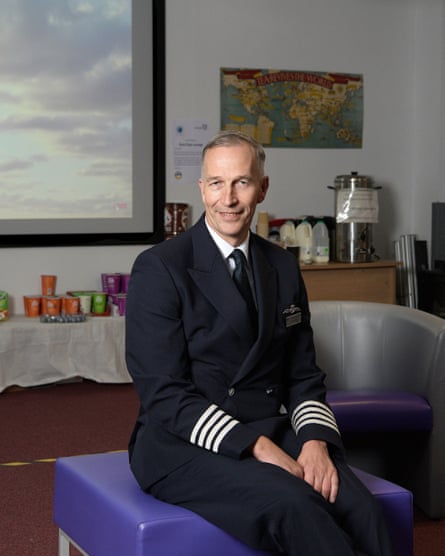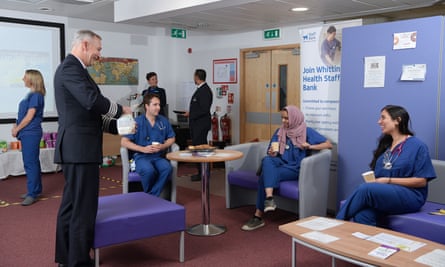“We offer NHS staff 15 to 20 minutes of escape from the decisions they have to take every day, because coronavirus has increased the pressure on them so much. We give them a cup of tea or frothy coffee and snacks, all delivered with an airline first-class smile. And we talk to them.”
Quick GuideWhat to do if you have coronavirus symptoms in the UK
Show
Symptoms are defined by the NHS as either:
- a high temperature - you feel hot to touch on your chest or back
- a new continuous cough - this means you've started coughing repeatedly
NHS advice is that anyone with symptoms should stay at home for at least 7 days.
If you live with other people, they should stay at home for at least 14 days, to avoid spreading the infection outside the home.
After 14 days, anyone you live with who does not have symptoms can return to their normal routine. But, if anyone in your home gets symptoms, they should stay at home for 7 days from the day their symptoms start. Even if it means they're at home for longer than 14 days.
If you live with someone who is 70 or over, has a long-term condition, is pregnant or has a weakened immune system, try to find somewhere else for them to stay for 14 days.
If you have to stay at home together, try to keep away from each other as much as possible.
After 7 days, if you no longer have a high temperature you can return to your normal routine.
If you still have a high temperature, stay at home until your temperature returns to normal.
If you still have a cough after 7 days, but your temperature is normal, you do not need to continue staying at home. A cough can last for several weeks after the infection has gone.
Staying at home means you should:
- not go to work, school or public areas
- not use public transport or taxis
- not have visitors, such as friends and family, in your home
- not go out to buy food or collect medicine – order them by phone or online, or ask someone else to drop them off at your home
You can use your garden, if you have one. You can also leave the house to exercise – but stay at least 2 metres away from other people.
If you have symptoms of coronavirus, use the NHS 111 coronavirus service to find out what to do.
Source: NHS England on 23 March 2020
British Airways pilot and captain Dave Fielding is explaining why aircrew left temporarily unemployed because most planes were grounded have begun working as volunteers in NHS hospitals, helping staff to unwind and cope with the rigours of dealing with the grim realities of Covid-19. The “tea and empathy” scheme, called Project Wingman, is proving popular with hospitals.

Fielding and colleagues from a number of airlines including easyJet, Virgin, Norwegian and SAS opened their first “first-class lounge” in the Whittington hospital in London two weeks ago, and then another at the nearby North Middlesex hospital. “It’s about using the skills aircrew have to spoil hospital staff and make them feel they’re special. They come off shift exhausted and weary and come into our lovely lounge and we pamper them, in the same way that passengers in first-class lounges at airports are used to being looked after. NHS staff aren’t used to being treated like that.
“Aircrew are good with people. We know how to ask the right questions and make people feel at their ease, as that’s what we do as crew. We’re now doing that in the NHS rather than in planes”.
The crew involved in Project Wingman are opening a similar facility this week in five other hospitals – two in the capital, two in Essex and one in Kent – and have a growing number of hospitals now asking if they can have a first-class lounge created on their site too.
The initiative is the brainchild of Fielding, Emma Henderson, an easyjet pilot, and Prof Rob Bor, a psychologist at the Royal Free hospital in London. Fielding, who usually flies an Airbus A380 to Singapore, and Henderson, whose usual routes include Europe and North Africa, run the peer support programme for pilots with their respective airlines, while Bor helps airlines look after their pilots’ mental health.
Henderson says: “Given our profession the name Project Wingman is a light-hearted nod to Top Gun. But more importantly it is rooted in the idea that someone is there to support you. That’s what we are offering to NHS frontline staff, as they are working hard to support those most in need.
“Like many others I just want to give back to the NHS at this critical time and the aim is to do what we can to support those at forefront of dealing with this health emergency. Rob came up with the idea. He could see that those working in hospitals at this time would benefit from some additional practical support.”
Fielding spends much of his time in the first-class lounge that has sprung up at the back of the Whittington’s canteen on its first floor. Henderson, however, does most of the organisational work to recruit more aircrew as Project Wingman volunteers and roll it out to other hospitals, as the fact that she lives with a vulnerable person means she cannot put herself in a hospital setting.
Initially, says Fielding, “staff want to talk about anything apart from Covid: about aeroplanes, places they’ve been and would like to visit, holidays they’re hoping to have, their fear of flying. We also get occasional aviation geeks and even had a doctor who wants to be a pilot.”
However, once a bond of trust has been created, adds the 52-year-old pilot, hospital staff often open up. “We’re starting to hear stories from them about what a tough time they’ve had that day, dealing with Covid patients.
“It’s about seeing the amount of death, and the volume of sick and dying patients. With almost every ward in the [Whittington] hospital a Covid ward now, it’s hard to escape. I’m astonished that they all have their own strategies for switching off. The beauty of Project Wingman is that it’s a little bit of escape from this grind.”

Maria Kane, the chief executive at North Middlesex hospital, says that her staff are finding real comfort in the presence of fellow professionals in uniform who are there to help them.
“Recreating a ‘first-class lounge’ experience is such a great idea. The ‘tea and empathy’ and cake, a cheerful welcome and time to listen all helps. The Project Wingman crews are here all day. For our staff who are working in the most extraordinary circumstances of their careers, facing really hard and stressful situations for their patients and with their colleagues, this is a real bonus to begin to help with the stresses and emotions they are experiencing.
